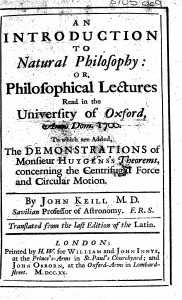Peter Anstey writes …
In my last post we met the instrument maker and promoter of experimental philosophy Francis Hauksbee the Elder. Hauksbee, however, wasn’t the first lecturer to give public lectures in England on the exciting new developments in natural philosophy. That honour rests with a Scotsman called John Keill.
John Keill (1671–1721) came under the tutelage of the first Newtonian David Gregory in Edinburgh. He followed Gregory to Oxford in 1691 and by 1699 was giving lectures. Around 1704/95, according to his student John Theophilus Desaguliers, Keill became ‘the fi rst who publickly taught Natural Philosophy by Experiments in a mathematical Manner’ (A Course of Experimental Philosophy, Volume 1, 1734, Preface). His lectures were published in Latin in 1702 and in English translation in 1720 under the title of An Introduction to Natural Philosophy: or, Philosophical Lectures read in the University of Oxford Anno Dom. 1700.
rst who publickly taught Natural Philosophy by Experiments in a mathematical Manner’ (A Course of Experimental Philosophy, Volume 1, 1734, Preface). His lectures were published in Latin in 1702 and in English translation in 1720 under the title of An Introduction to Natural Philosophy: or, Philosophical Lectures read in the University of Oxford Anno Dom. 1700.
It is not clear, however, that Keill saw himself as teaching experimental philosophy. Some scholars have claimed that Keill was appointed as a lecturer in experimental philosophy at Oxford in 1704 and that he was the first to teach experimental philosophy there. Indeed, in 1707 The Oxford Intelligencer advertised his ‘Course of Mechanical and Experimental Philosophy’. Moreover, in the preface to his Introduction to Natural Philosophy he does express his opposition to speculative natural philosophy, particularly Cartesianism, singling out the Cartesian theory of gravity for particularly harsh treatment (pp. iv–vii).
Hence, one might naturally assume that he is a straightforward advocate of experimental philosophy, and yet this is not the case. For, in the first lecture Keill proceeds to distinguish four ‘Sects of Philosophers’: the Pythagoreans and Platonists; the Peripatetics; those who ‘proceed upon Experiments; and the Mechanical’ (pp. 1–3). He then informs the reader that ‘Amongst these various ways of Philosophizing, there is no particular one, wherein we do intirely acquiesce’ (p. 3). In fact, Keill saw himself as pursuing, not the new experimental philosophy, but what he calls ‘Mathematical Philosophy’ inspired by Newton and characterized by ‘applying Geometry to Natural Philosophy’.
As for experimental philosophy, Keill warns that:
- many of the Experiments that the third Sect of Philosophers [experimental philosophers] have delivered down to us, must be made use of: tho this ought not to be done without great Caution; for we are well apprised how fond these Gentlemen are of their Theories, how willing they are that they should be true, and how easily they deceive both others and themselves, in trying their Experiments (p. 7).
It is clear from this passage that Keill’s conception of what constitutes an experimental philosopher differs from that of Boyle and others, for Keill finds them too fond of their theories, whereas what characterises the experimental philosophers throughout the latter decades of the seventeenth century is their extreme caution in making any theoretical commitments until the observational and experimental data is assembled. Keill’s experimental philosopher would be foreign to most who aligned themselves with the movement.
The method that Keill follows instead is that of ‘The great Philosopher of this age, the most Ingenious and Incomparable Mr. Newton’ who ‘by his great and deep skill in Geometry’ was able to show the inconsistencies of Descartes’ vortex theory. Keill’s opponents in natural philosophy were not the speculative philosophers but ‘our ungeometrical Philosophers’ (p. 24). Thus Keill is representative of the first generation of those, like John Arbuthnot and John Harris who, inspired by Newton, adopted a straightforwardly mathematical approach to natural philosophy. Surprisingly, Keill’s reservations about experimental philosophy were completely ignored by the likes of Hauksbee the Elder and Desaguliers who preferred to see their efforts in promoting experimental philosophy as following Keill’s example and, in Desaguliers’ case, even recycling some of his lectures.

